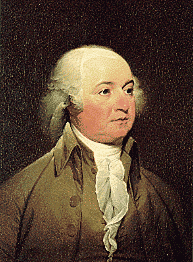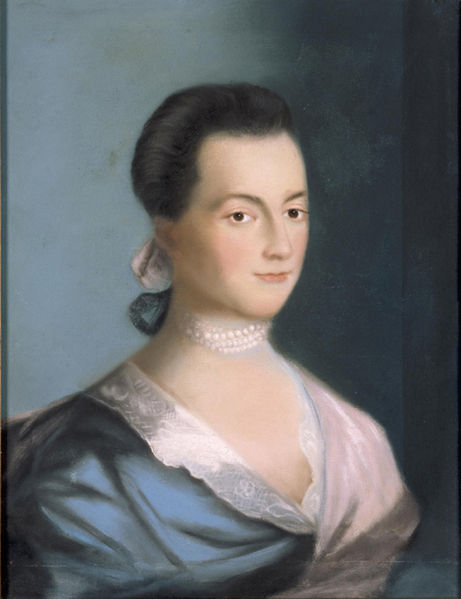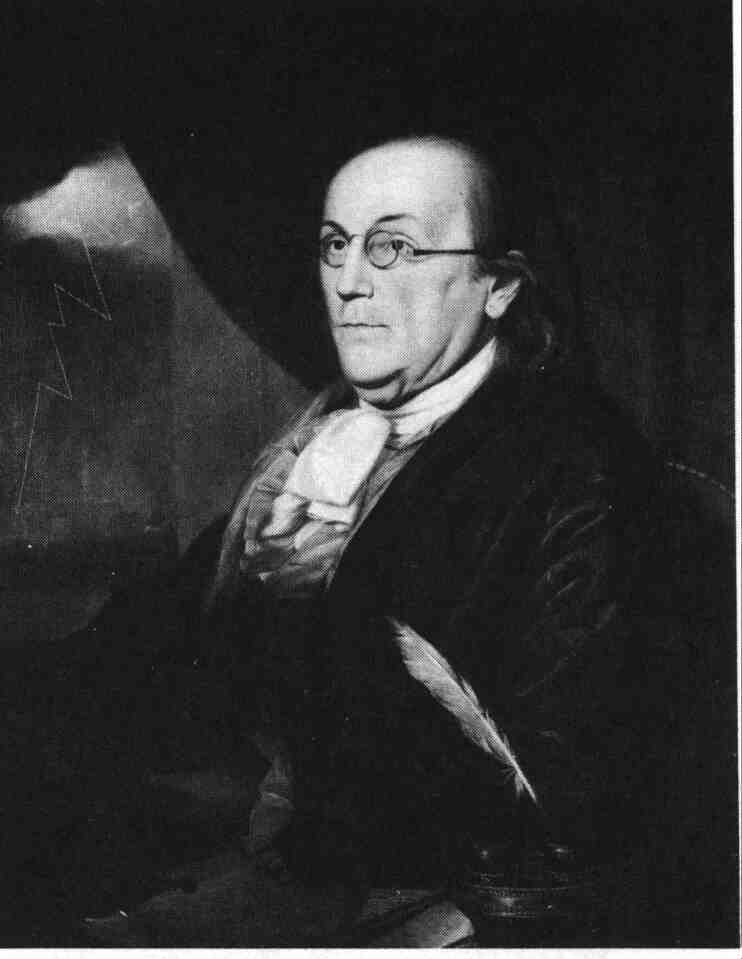|
|
Online Texts for Craig White's Literature Courses
|
|
|
|
|
 John Adams, 2nd president of USA (1796-1800) |
![]()
Letters by Abigail & John Adams (+ a journal note)
on Benjamin Franklin
(compare Letters of Abigail & John Adams on the Declaration of Independence & Women's Rights)
![]()
Discussion questions:
1. Compared to writings by the USA's Founding Fathers like the Constitution, the Declaration, or the Federalist Papers, how do these letters give some of the pleasures readers normally associate with creative literature like fiction?
2. What elements of fiction are present in these letters? Consider characterization, scene, dialogue.
3. What implications for literature as we currently teach it that we avoid the documents that establish our laws but enjoy texts that avoid history and politics in favor of private or personal lives? (This inclination can be criticized or defended.)
4. Mrs. Adams was descended from a Puritan family of ministers. What significance that during the Enlightenment / Age of Reason she identifies Franklin as a "Christian" and a "religious man?"
![]()
John Adams to Abigail Adams
[Mr. Adams writes from Philadelphia where he and Franklin participated in the Continental Congress considering Independence from Great Britain.]
Philadelphia, 23 July 1775 [i.e., a year before Declaration of Independence]
MY DEAR,
[1.1]
You have more than once, in your letters, mentioned
Dr. Franklin,
and in one, intimated a desire that I should write you something
concerning him.
[1.2]
Dr. Franklin
has been very constant in his attendance on Congress from the beginning. His
conduct has been composed and grave, and, in the opinion of many gentlemen,
very
reserved. He has not assumed anything, nor affected to take the lead; but has
seemed to choose that the Congress should pursue their own principles and
sentiments, and adopt their own plans.
[1.3]
Yet he has not been
backward [silent]:
has been very useful on many occasions, and discovered
[shown]
a disposition
[attitude]
entirely American. He does not hesitate at our boldest measures, but rather
seems to think us too irresolute and backward.
[1.4]
He thinks us at
present in an odd state, neither in peace nor war, neither dependent nor
independent; but he thinks that we shall soon assume a character more decisive.
He thinks that we have the power of preserving
[taking care of]
ourselves; and that even if we
should be driven to the disagreeable necessity of assuming a total independency,
and set up a separate state
[nation], we can maintain it.
[1.5]
The people of
Yours,
![]()
Abigail Adams to John Adams
5 November,
1775.
[2.1]
I hope you have received several letters from me in this
fortnight past. I wrote by Mr. Lynch and by
Dr. Franklin,
the latter of whom I had the pleasure of dining with, and of admiring him, whose
character from my infancy I had been taught to venerate
[respect].
I found him social but not talkative, and, when he spoke, something useful
dropped from his tongue. He was grave, yet pleasant and affable
[friendly]. You know I make some pretensions to
physiognomy
[face as key to personality],
and I thought I could
read in his
countenance the virtues of his heart, among which patriotism shone in its full
luster; and with that is blended every virtue of a Christian. For a true patriot
must be a religious man.
[2.2]
I have been led to
think from a late defection
[desertion], that
he who neglects his duty to his Maker, may
well be expected to be deficient and insincere in his duty towards the public.
Even suppose him to possess a large share of what is called
honor and public spirit, yet, do not
these men, by their bad example,
by a loose, immoral conduct, corrupt the minds of youth, and vitiate
[pollute] the
morals of the age, and thus injure the public more than they can compensate by
intrepidity, generosity, and honor? Let revenge or ambition, pride, lust, or
profit, tempt these men to a base and vile action; you may as well hope to bind
up a hungry tiger with a cobweb, as to hold such debauched patriots in the
visionary chains of decency, or to charm them with the intellectual beauty of
truth and reason. . . .
![]()
John Adams to Abigail Adams
[3.1] On this day [9 Sept. 1776], Mr. Franklin, Mr. Edward Rutledge [1749-1800; signer of Declaration, later governor of SC] and Mr. John Adams proceeded on their journey to Lord Howe on Staten Island . . . ; the first night we lodged at an Inn, in New Brunswick [in New Jersey]. On the road and at all the public houses, we saw such numbers of officers and soldiers, straggling and loitering, as gave me at least, but a poor Opinion of the Discipline of our forces and excited as much indignation as anxiety. Such thoughtless dissipation [drunkenness] at a time so critical was not calculated to inspire very sanguine [confident] hopes or give great courage to ambassadors [negotiators like Adams & Franklin]: I was nevertheless determined that it should not dishearten me. I . . . had no doubt but we should be chastised into order in time. [<A very Puritan note from Adams, a late Puritan of Massachusetts, in its anticipation of divine chastisement, as seen in Mary Rowlandson or Cotton Mather]
Adams letters adapted from http://www.familytales.org/results.php?tla=jod
![]()
from the Autobiography of John Adams (compiled from Adams's journal)
(recollection of traveling with Franklin to the Continental Congress)
[4.1]
The Taverns were so full we could with
difficulty obtain entertainment
[accommodations].
At
[4.2] The window was open, and I, who was an invalid [ill] and afraid of the Air in the night, shut it close.
[4.3]
Oh! says
[4.4] Come! Open the window and come to bed, and I will convince you: I believe you are not acquainted with my Theory of Colds.
[4.5] Opening the window and leaping into bed, I said I had read his Letters to Dr. Cooper [Samuel Cooper (1725-83), Boston minister] in which he had advanced, that nobody ever got cold by going into a cold church, or any other cold air: but the theory was so little consistent with my experience that I thought it a paradox [contradiction]: However I had so much curiosity to hear his reasons, that I would run the risk of a cold.
[4.6] The Doctor [Franklin] then began a harangue [long speech] upon air and cold and respiration and perspiration, with which I was so much amused that I soon fell asleep, and left him and his philosophy together: but I believe they were equally sound and insensible, within a few minutes after me, for the last words I heard were pronounced as if he was more than half asleep. . . .
[4.7] The next morning we proceeded on our journey . . . .
from John
Adams autobiography, part 1, "John Adams," through 1776, sheets 43-44 of 53
[electronic edition].





